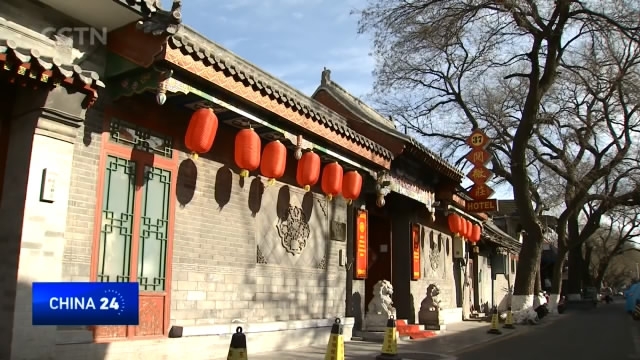
21:12, 05-Jan-2018
Historic Hutongs: Beijing restores traditional hutong culture

Just east of the Forbidden City in the Chinese capital lies the Dongsi hutongs, an area filled with some of the oldest traditional alleyways in Beijing. Over the past year, these hutongs have undergone major restoration as Beijing and its residents both struggle to find a balance between traditional and modern values. CGTN's Ren Xueqian reports.
Once a busy street filled with bar-goers and small businesses, today's Dongsi hutongs are putting tranquillity and traditions first.
Since the spring of 2017, the city has banned multiple illegal constructions, unlicensed businesses and storing personal belongings on the streets. It's part of the effort to better preserve the history of these ancient alleyways and improve the management of the community.
DONGSI RESIDENT "There used to be a wall here and when it was removed, residents were concerned about safety, but now seeing the result, the area is cleaner and more organized."
Over half of the people living in these hutongs are long-term residents who have been here for many generations. Though the renovations have constrained the bustling lifestyle, locals are beginning to see the improvements in their community, and welcome them.
DONGSI RESIDENT "It's less convenient now when I need something from the store because the shops are gone. But the neighborhood is quieter and looks more like what it did before and younger generations can learn to appreciate its history."
With the majority of small businesses removed, brick walls and residential gateways have been restored to their original style and color, while the city is aiming to complete restorations by the end of 2018.
SHI LIANG ARCHITECT "Repairs are made with input from the residents. Ultimately they will realize what we're restoring is our collective past, and the memories we have of our homes will serve to properly tell Dongsi's story."
A sense of longing for a more peaceful hutong that's in line with traditions is also present in the younger residents.
As one of the last businesses still standing in the Dongsi hutongs, Ma Zheng hopes to raise awareness of cultural preservation through the combination of old and new values.
MA ZHENG OWNER, DOUBLE HAPPINESS COURTYARD "I grew up in these hutongs and I want to share my experiences with tourists and show them what life was like back then."
The Dongsi hutongs consist of ten parallel alleyways numbered in ascending order from south to north. In 2015, Dongsi's third to eighth alleyways were officially included in China's list of historical and cultural neighborhoods. Restoration of the Dongsi hutongs is just one of many examples of the city's ongoing efforts to preserve what's left of old Beijing. Ren Xueqian, CGTN, Beijing.

SITEMAP
Copyright © 2018 CGTN. Beijing ICP prepared NO.16065310-3
Copyright © 2018 CGTN. Beijing ICP prepared NO.16065310-3